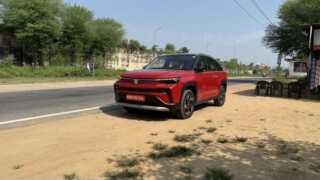Follow us today…
Many still scoff at the idea of towing with an electric truck, but the skepticism doesn’t match reality. While long-distance towing might not be ideal for EVs, short to moderate hauls are entirely practical. For example, the Silverado EV and the Ford F-150 Lightning, with their large battery and heavy build, perform particularly well in this area.
This has led to a lot of interesting social media buzz about towing with electric trucks. Here’s a recent, thoughtful post on Reddit by jturkish with a ton of positive responses from other EV owners about their towing experiences.
“I’m relatively new to camping with a trailer. I’ve been doing it for about 10 years but I only go a handful of times a year so I still feel kind of new and fresh to it.
This F-150 lightning from 2023 is my third tow rig. I’ve owned it brand new since 2023 and we have taken it out camping maybe four or five times.
With past tow vehicles, I’d always been a little bit stressed out and had some anxiety towing just because of the engine is screaming really loud, working hard. Always monitoring transmission temperature oil temperatures. It’s been a little stressful for me just so I don’t hurt the vehicle or ruin the vehicle.
This lightning, however, has been a dream. It tows effortlessly. The power is on demand. It is available all the time. There are no RPMs or transmission temperature I have to worry about or oil temperature. It’s quiet, seamless and just very relaxing”
Terrh responded with a comment about possible commercial usage:
“Where these will really shine is for contractors who mostly tow a small enclosed trailer 100 miles a day around a city. Probably almost make the payments in fuel savings alone.
But everyone seems to think that the only kind of towing anyone does is long-distance high-speed stuff, which of course these are terrible at. For slower paced trips or the guys that run around the city all day, these are perfect.”
ScriptThat added a comment about towing with a “regular” EV:
“I regularly tow a 2-horse trailer, and used to do that with our regular ol’ manual diesel MPV. Now I do the same with a Volvo C40 Recharge, and I’m happy as a clam.
It’s absolutely possible to find a nice (“regular”) EV that can be used to tow trailers.”
Testing the Impact of Payload Weight on Efficiency
Aging Wheels, a popular YouTube channel, tested the Chevy Silverado EV’s towing and hauling capacity. They started by adding a 1,600-pound load of shingles to test the Silverado EV’s efficiency under max payload. Across a consistent 60-mile highway loop at 75 mph, the added weight dropped efficiency by only 4.3%. In real-world driving, that small dip is almost unnoticeable. Weight had such minimal impact that even removing the bed cover which caused slightly more aerodynamic drag might explain most of the drop.
Weight Impact to Both Gas and Electric Trucks
The same test was performed in a gas-powered F-150 with a 5.0L V8. Surprisingly, adding the same weight had no statistically significant effect on fuel efficiency. Whether gas or electric, payload weight alone doesn’t meaningfully reduce efficiency on the highway.
Advertising
Wind Resistance Matters More Than Weight
Aerodynamics proved to be a game-changer. Towing a mostly empty trailer immediately reduced efficiency compared to running without one. Simply rearranging the cargo to create a sail-like surface made things worse. In one dramatic test, the truck nearly ran out of charge after pulling a makeshift air brake at highway speeds. Weight may be heavy, but air is what really drives down the range.
Comparing Trailer Configurations
A series of trailer tests with various cargo types and shapes revealed that it’s not the mass of what you’re pulling but the shape of it that kills your range. A 4,500-pound Polestar on a flatbed barely changed efficiency compared to the same trailer without it. In contrast, a tall, boxy structure on the trailer slashed range nearly in half. One more test with a heavier F-150 on the trailer confirmed that vertical profile hurts efficiency far more than mass.
Comparing EV Trucks: Silverado vs. Rivian
A direct test against the Rivian R1T showed that while the Rivian was much more efficient with no trailer, the two trucks delivered nearly identical results while towing the same trailer. The takeaway is that trailers are the great equalizer. The Silverado’s larger battery gave it an edge in range, even though the Rivian is more refined in nearly every other category.
Charging Speed and Range While Towing
The Silverado EV’s max pack offers the fastest DC charging of any electric truck currently available. It can add about 160 miles of towing range in 40 minutes at a peak rate of 370 kW, assuming climate control is off. That’s nearly double what some rivals can manage in the same time frame, due to smaller batteries or slower charge curves.
Cost of Fuel for EV vs. Gasoline
At home electricity rates around 9¢ per kWh, driving the Silverado EV cost one-third as much as fueling the F-150 over 100 miles. Even under the worst towing conditions tested, the Silverado still beat the gas-powered F-150 with a 5.0L V8 in fuel cost. Rapid charging, however, flips the script. At 40¢ per kWh, towing with the Silverado costs more than driving the gas truck. Until rapid charging rates come down, home charging is essential to keep electric truck ownership economical.
Regenerative Braking and Weight
Tests from 0 to 70 mph and back to 0 showed that regenerative braking might actually be more efficient with added weight. The Silverado used slightly less net energy during deceleration when carrying a heavy load, hinting at how regen recaptures more power when there’s more mass to slow down.
Final Thoughts and Next Steps
Weight doesn’t ruin range, wind resistance does. EV trucks like the Silverado can tow just fine, especially when used within their range comfort zone and supported by home charging. The results debunk common myths around electric trucks and towing.
Please Drop Your Thoughts in the Comments Below
How does your towing experience with a gas or diesel truck compare to the EV experience shared in this article?
Why do you think so many people still scoff at towing with an EV, even with data like this available?
Chris Johnston is the author of SAE’s comprehensive book on electric vehicles, “The Arrival of The Electric Car.” His coverage on Torque News focuses on electric vehicles. Chris has decades of product management experience in telematics, mobile computing, and wireless communications. Chris has a B.S. in electrical engineering from Purdue University and an MBA. He lives in Seattle. When not working, Chris enjoys restoring classic wooden boats, open water swimming, cycling and flying (as a private pilot). You can connect with Chris on LinkedIn and follow his work on X at ChrisJohnstonEV.
Image sources: jturkish on Reddit, Volvo media kit, Chevy media kit
Follow us today…
Source: torquenews.com










